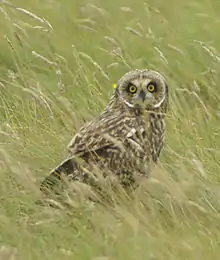сова
Bulgarian

Забулена сова

Същинска сова
Etymology
From Proto-Slavic *sova, possibly of onomatopoeic origin distantly related to English howl.
Pronunciation
- IPA(key): [ˈsɔvə]
Declension
Declension of со́ва
| singular | plural | |
|---|---|---|
| indefinite | со́ва sóva |
со́ви sóvi |
| definite | со́вата sóvata |
со́вите sóvite |
| vocative form | со́во sóvo |
со́ви sóvi |
Hyponyms
Related terms
- со́вам (sóvam, “to shove, to shuttle”) (dialectal, possibly cognate)
- сова́лка (soválka, “shuttle”)
Russian
Etymology
Inherited from Proto-Slavic *sova.
Pronunciation
- IPA(key): [sɐˈva]
audio (file)
Noun
сова́ • (sová) f anim (genitive совы́, nominative plural со́вы, genitive plural сов)
- owl
- бе́лая сова́ ― bélaja sová ― (Bubo scandiacus, syn. Nyctea scandiaca) snowy owl
- уша́стая сова́ ― ušástaja sová ― (Asio otus) horned owl
- night person, night owl
Usage notes
In Russian culture, owls are not known for their wisdom; rather, they symbolize daytime blindness and absent-mindedness.
Declension
Descendants
- → Ingrian: sova
Serbo-Croatian
Etymology
From Proto-Slavic *sova.
Declension
Further reading
- “сова” in Hrvatski jezični portal
Ukrainian
Etymology
From Proto-Slavic *sova.
Pronunciation
- IPA(key): [sɔˈʋa]
Audio (file)
Declension
References
- Bilodid, I. K., editor (1970–1980), “сова”, in Словник української мови: в 11 т. [Dictionary of the Ukrainian Language: in 11 vols] (in Ukrainian), Kyiv: Naukova Dumka
This article is issued from Wiktionary. The text is licensed under Creative Commons - Attribution - Sharealike. Additional terms may apply for the media files.